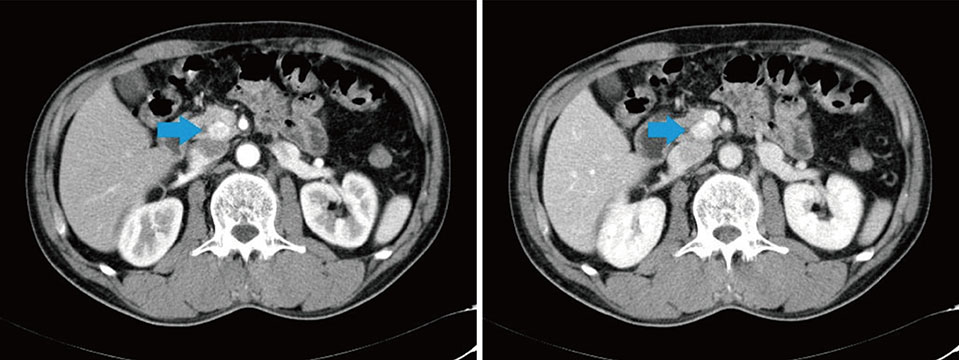Dement Neurocogn Disord.
2014 Dec;13(4):146-149. 10.12779/dnd.2014.13.4.146.
A Case of Insulinoma Presenting as Repetitive Abnormal Behavior with Amnesia
- Affiliations
-
- 1Department of Neurology, Dong-A University College of Medicine, Busan, Korea. neuropark@dau.ac.kr
- 2Cognitive Disorders and Dementia Center, Dong-A University Hospital, Busan, Korea.
- KMID: 2443080
- DOI: http://doi.org/10.12779/dnd.2014.13.4.146
Abstract
- Insulinomas are very rare tumors. Diagnosis of insulinoma is often delayed or misdiagnosed because of its various symptoms. We report a patient with hypoglycemic encephalopathy who had repetitive behavior changes, diagnosed as a pancreatic insulinoma. A 52 years old man was referred to a memory and dementia clinic for evaluation of his repetitive abnormal behavior changes. He has threatened his wife with violent acts and showed aggressive behaviors, but he couldn't remember when he was recovered to normal state. During the hospitalization, we noticed that his repetitive abnormal behaviors were correlated to severe hypoglycemia. After we corrected glucose level, his symptoms were disappeared. We performed an abdomen-pelvis CT scan, revealing pancreatic head tumor. After he took surgical treatment, His symptoms were fully recovered. Our case demonstrates that various neurological symptoms, such as abnormal behavior, rarely occur due to recurrent hypoglycemia in patient with insulinoma.
MeSH Terms
Figure
Reference
-
1. Wilder KM, Allan FN, Power MH. Carcinoma of the island of the pancreas: hyperinsulinism and hypoglycemia. JAMA. 1927; 89:347–355.
Article2. Wang S, Hu HT, Wen SQ, Wang ZJ, Zhang BR, Ding MP. An insulinoma with clinical and electroencephalographic features resembling complex partial seizures. J Zhejiang Univ Sci B. 2008; 9:496–499.3. Suzuki K, Miyamoto M, Miyamoto T, Hirata K. Insulinoma with earlymorning abnormal behavior. Intern Med. 2007; 46:405–408.4. Do YR, Kwon OD, Kim JE, Do JK, Lee DK. Complex partial seizure like symptoms presented by a patient with insulinoma and hyperproinsulinemia. J Korean Epilep Soc. 2004; 8:167–170.
Article5. Cho H, Choi YH, Cho YN, Kim WJ. Insulinoma presenting as a parasomniamimic symptoms. J Korean Sleep Res Soc. 2010; 7:57–60.
Article6. Dizon AM, Kowalyk S, Hoogwerf BJ. Neuroglycopenic and other symptomsin patients with insulinomas. Am J Med. 1999; 106:307–310.7. Service FJ, McMahon MM, O'Brien PC, Ballard DJ. Functioning insulinoma-incidence, recurrence, and long-term survival of patients: a 60-year study. Mayo Clin Proc. 1991; 66:711–719.8. Whipple AO. Hyperinsulinism in relation to pancreatic tumors. Surgery. 1944; 16:677–681.9. Shin JJ, Gorden P, Libutti SK. Insulinoma: pathophysiology, localizationand management. Future Oncol. 2010; 6:229–237.
- Full Text Links
- Actions
-
Cited
- CITED
-
- Close
- Share
- Similar articles
-
- Insulinoma Presenting as Hypersomnia and Unconscious Wandering
- Complex Partial Seizure Like Symptoms Presented by a Patient with Insulinoma and Hyperproinsulinemia
- Transient Global Amnesia Developed after Zolpidem Intake
- Retrograde Amnesia as a Predominant Symptom of Transient Global Amnesia
- Repetitive Questioning and Writing in a Patient with Transient Global Amnesia




